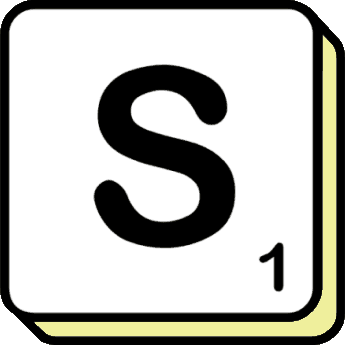Words With Letter U
Point Scoring
The letter U scores 1 in Scrabble, 2 in Words with Friends and 2 in Wordfeud
Fun facts about the letter U
The letter U is the 21st letter of the English alphabet, and it has a fascinating history filled with fun, interesting, and historical facts. From its origins in ancient Greek to its use in modern technology, the letter U has played an important role in language and culture.
The letter U has its origins in the Greek letter upsilon, which was originally pronounced like the "u" in "put". This letter was later adapted into the Latin alphabet as the letter V, which was used to represent both the "u" and the "v" sounds. It wasn't until the 16th century that the letter U was introduced to the Latin alphabet as a separate letter, to represent the "u" sound.
In English, the letter U is used as a vowel and can be found in many words, including "up", "use", and "under". The letter U is also used in conjunction with other vowels to create diphthongs, such as "ou" in "house" and "ui" in "circuit".
One of the most interesting facts about the letter U is its association with the concept of unity. The letter U is used in many words to represent the idea of oneness or coming together, such as "union", "unity", and "united". The letter U is also used in the abbreviation "USA" to represent the idea of the United States of America.
The letter U has also played an important role in science and technology. In physics, the letter U is used to represent the unit of energy known as the "electron volt". In chemistry, the letter U is used to represent the "ununhexium" element, which is a superheavy element with the atomic number 116.
In addition to its scientific and technological uses, the letter U has also played an important role in art and culture. In music, the letter U is used to represent the note "ut" in the solfege system. In film, the letter U is associated with the character of "Uncle" from the classic movie "Uncle Buck", played by John Candy. In literature, the letter U is associated with the character of Uriah Heep from the classic novel "David Copperfield" by Charles Dickens.
The letter U has also played an important role in language and linguistics. In many languages, including English, the letter U is pronounced differently depending on its placement within a word. For example, the letter U in the word "up" is pronounced with a sharp, percussive sound, while the letter U in the word "under" is pronounced with a softer, more rounded sound.
Finally, the letter U has played an important role in religious and spiritual contexts. In Christianity, the letter U is associated with the concept of the "unconditional love" of God. In Hinduism, the letter U is associated with the throat chakra, or energy center, which is located at the base of the neck and is associated with communication and self-expression.
In conclusion, the letter U is a fascinating and versatile letter with a long and interesting history. Whether we are using it to represent a sound, a concept, or a cultural symbol, the letter U continues to play an important role in our language, culture, and understanding of the world around us.
Word listings
Begins With
Words beginning with UAWords beginning with UBWords beginning with UCWords beginning with UDWords beginning with UEWords beginning with UFWords beginning with UGWords beginning with UHWords beginning with UIWords beginning with UJWords beginning with UKWords beginning with ULWords beginning with UMWords beginning with UNWords beginning with UPWords beginning with URWords beginning with USWords beginning with UTWords beginning with UVWords beginning with UWWords beginning with UX
Ends With
Words ending with AUWords ending with BUWords ending with CUWords ending with DUWords ending with EUWords ending with FUWords ending with GUWords ending with HUWords ending with IUWords ending with JUWords ending with KUWords ending with LUWords ending with MUWords ending with NUWords ending with OUWords ending with PUWords ending with RUWords ending with SUWords ending with TUWords ending with UUWords ending with WUWords ending with XUWords ending with YUWords ending with ZU
